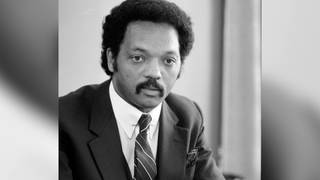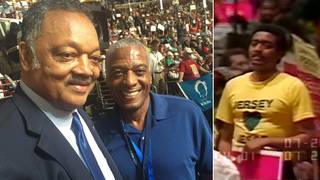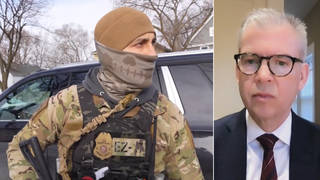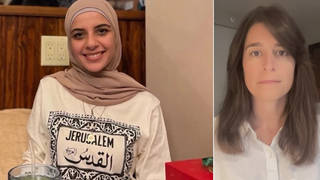
Guests
- María Carriónfreelance journalist and executive director of the Sahara International Film Festival.
We go to the U.N. Human Rights Council in Geneva, where activists are shining a light on Morocco’s brutal occupation of Western Sahara and its Indigenous people, the Sahrawi. The Sahrawi journalist and activist Asria Mohamed speaks with Democracy Now!’s Amy Goodman about “Jaimitna,” an art installation that evokes the tents of Sahrawi people living in refugee camps. The installation features various melhfas, traditional clothing worn by Sahrawi women, and includes their stories. “These women, they spent years and years in prison. They have been tortured. They have been beaten up. They have been raped,” Mohamed says. We also speak with María Carrión, executive director of FiSahara, the Sahara International Film Festival, who says the story of the Sahrawi must be better known. Morocco has occupied Western Sahara since 1975 in defiance of the United Nations and the international community. The first Trump administration recognized Moroccan sovereignty in 2020 as part of a larger effort to normalize relations between Israel and its Arab neighbors.
Transcript
NERMEEN SHAIKH: This is Democracy Now!, democracynow.org, The War and Peace Report. I’m Nermeen Shaikh in New York.
AMY GOODMAN: And I’m Amy Goodman in Geneva, Switzerland. We’re broadcasting from the United Nations Human Rights Council, that is behind me right now, in an unusual event. A tent has just been erected at the doorway, the entrance to the U.N. Rights Council, that is made of the melhfas, the dresses of 19 Sahrawi human rights defenders, women who have been subjected to sexual violence, political violence by the Moroccan occupation of Western Sahara. Yesterday, I had the chance to go into the tent, when it was first erected, and speak to the woman, the creator, the Sahrawi refugee who created it.
AMY GOODMAN: I’m Amy Goodman of Democracy Now! We’re here in Geneva inside a “Jaimitna.” What’s a Jaimitna? Well, we have the woman who created it here to describe. Tell us your name and what we’re standing in. What is this structure?
ASRIA MOHAMED: My name is Asria Mohamed. I am from Western Sahara, but I was born and I grew up in the Sahrawi refugee camps. And “Jaimitna” is actually a mini version of the tent where I grew up in the Sahrawi refugee camps. So, this is very a mini version of it, and this is a storytelling — a human rights storytelling project, which both convey the story of Sahrawis, their identity and their culture. So, from outside, it’s made from the same material. It’s canvas that is typically given by the humanitarian aid. And from inside, and that’s what’s special about it, it has melhfa. And melhfa is Sahrawi traditional clothing. It’s similar to sari. It’s three meters times —
AMY GOODMAN: Women’s dress.
ASRIA MOHAMED: Women’s dress, yes. And what’s special about it, normally, we would use normal, plain fabric, but the new idea is that I asked 19 human rights defenders to send their clothing. Textile could be very powerful. It’s the most authentic way for these women to be here. They are not allowed to be here. They are all from the occupied territories of Western Sahara.
AMY GOODMAN: And it’s their own saris —
ASRIA MOHAMED: Yes.
AMY GOODMAN: — their own dresses —
ASRIA MOHAMED: Their own —
AMY GOODMAN: — their own melhfas.
ASRIA MOHAMED: Their own melhfas, which they wear. I mean, I don’t know if we could move on the other side, but in that melhfa there, it’s for a human rights defender called Zeinabu. And this woman, she sent me her melhfa, which has actually blood stain on it. I decided to cut away the blood, but I still actually have it here. I can show it to you later. And it was from a demonstration where she was violently beaten up by the Moroccan police.
AMY GOODMAN: So, talk about the QR codes. They look like price tags that are hanging off of each melhfa.
ASRIA MOHAMED: This project was installed in Madrid and in Valencia. When people come inside, and you see it yourself, it’s very colorful. It’s very beautiful. And then people associate it with something positive. But then, when they scan, when they scan the QR codes, it takes them to women’s stories, to women biographies. And what was very important for me, Amy, is that it’s often that we only show the suffering. And these women, they spent years and years in prison. They have been tortured. They have been beaten up. They have been raped. But what is also special about “Jaimitna,” that I want to show the strength of them. So, most of them — some of them are artists. Some of them are singers. Some of them are writers. And that’s very important for me to also show.
AMY GOODMAN: And what’s astounding is that this “Jaimitna” is going to appear at the U.N. Human Rights Council. It’s going to be constructed right next to it.
ASRIA MOHAMED: Yes. And I think when I started this project, it was because these women are not allowed — they are often not allowed to leave their country. They are not allowed to leave the occupied territories of Western Sahara. So, for me, that these melhfas or this project, “Jaimitna,” will represent them. And that’s — they cannot be in the U.N. Human Rights Council. They cannot say their stories. They cannot say their voice. But “Jaimitna” gonna be their voice. “Jaimitna” gonna be their picture. And again, what is the most authentic way is that their textile, their own melhfa, that they use it in demonstration and to fight, will be fighting again for them in the Human Rights Council.
AMY GOODMAN: You’ve been listening to — you’ve been listening to a description of the tent, the jaima, that has been erected here at the U.N. Human Rights Council, made of the dresses, the melhfas, of 19 women human rights defenders.
We’re joined right now outside the U.N. Human Rights Council, actually overlooking it, by María Carrión. She’s executive director of FiSahara, the international film festival that takes place in the refugee camps of the Sahrawis that are not in occupied Western Sahara, but are in Algeria.
María, give us a little larger context. We just have a few minutes. Who are the Sahrawi people, and what are they calling for, and the significance of being here at the U.N. Human Rights Council?
MARÍA CARRIÓN: I understand that many viewers and listeners may not know where Western Sahara is or that it exists. It’s a territory that is located between North — in North Africa between Morocco and Mauritania. It was colonized by Spain. And when Spain left in 1975, Morocco invaded, with the complicity and support of the United States, France and many other countries. There was a war after that, with Sahrawi trying to liberate it and decolonize their territory. They were bombed with napalm. Half of the population fled to Algeria, which is where — in the camps, where Asria is from. And the other half stayed behind under occupation. After, there was a ceasefire in 1991 brokered by the United Nations, and the U.N. had then offered the Sahrawi people the chance to have a referendum on self-determination. It was a non-self-governed territory. Until now, that referendum has not taken place. Morocco has impeded this referendum from taking place. And —
AMY GOODMAN: Until recently, no country recognized Morocco’s annexation of Western Sahara. Then, under President Trump, they became the first country, the U.S.
MARÍA CARRIÓN: Exactly. And this was the Abraham Accords, of course, with Israel and Arab countries normalizing their diplomatic relations. Everyone named their price. Morocco named their price, and their price was U.S. recognition of sovereignty.
AMY GOODMAN: I want to go to the person who introduced the side panel, who hosted it, the ambassador to the U.N. Human Rights Council here in Geneva. He’s from South Africa, the South African Ambassador Nkosi.
MXOLISI NKOSI: The heart-wrenching testimonies that we have listened to from Sahrawi women who are on the frontlines, who are at the receiving end of the repression by the security forces of Morocco, indeed, their voices will never be silenced. The courage of Sahrawi women comes squarely to the fore in the illuminating report “Resilience in Resistance,” highlighted by panelists. The report documents how Sahrawi women endure widespread, systemic human rights violations for simply daring to resist injustice. These violations form part of a deliberate misogynistic strategy, what the report terms “wheel of reprisals” against Sahrawi women because of their gender and status in society, in order to instill a climate of fear. This is because, through their resistance, Sahrawi women effectively expose the carefully crafted narrative which seeks to whitewash the brutality of foreign occupation.
This side event, therefore, is especially timely, given that the June session of the Human Rights Council is commonly referred to as the gender session. As such, it is a pity that many states who profess to be advocates of human rights and gender champions are not here with us today. Their absence is conspicuous. It speaks volumes, and it leaves an impression, namely, that Sahrawi women, and, indeed, all women under foreign occupation, are somehow less than human. As a country that prizes gender equality, for South Africa, the violence and discrimination being perpetrated against Sahrawi women can never be countenanced. Indeed, we are a nation born of women human rights defenders who fought valiantly against apartheid to secure equity for women not only in our country, but everywhere else in the world. South Africa, therefore, is pleased to be associated with this event. This is more so the case as the struggle of the Sahrawi women does not exist in a vacuum, but forms part of a broader struggle for the self-determination of Western Sahara.
AMY GOODMAN: That’s the South African ambassador and permanent representative of South Africa to the U.N. Human Rights Council here in Geneva, Ambassador Nkosi. María Carrión, you’re executive director of Nomads HRC and the head of the FiSahara International Film Festival that takes place in Algeria. It’s filled with more than 100,000 Sahrawis who have taken refuge from Moroccan-occupied Western Sahara. We just have a minute. But if you can respond to the significance of the South African ambassador hosting this? I also testified, because Democracy Now! is the last journalist to get into Western Sahara, and we did a documentary called Four Days in Western Sahara: Africa’s Last Colony. What people are calling for here?
MARÍA CARRIÓN: They’re calling for respect for human rights of the people of Western Sahara. They’re calling for the U.N. to have a monitoring system, human rights monitoring system, which they do not in Western Sahara. They’re calling for a chance to have a referendum on self-determination for Sahrawis to decide their future. They’ve been waiting for over 30 years for this. And they all —
AMY GOODMAN: The significance of this side panel hearing?
MARÍA CARRIÓN: It’s important to have also South Africa supporting the Sahrawi people. South Africa is a longtime supporter of liberation movements around the world, and it has always been on the side of the Sahrawi people.
AMY GOODMAN: We’ll be doing more on this, and people can check out the documentary, Four Days in Western Sahara: Africa’s Last Colony, at democracynow.org. María Carrión, thank you so much. Back to you, Nermeen, in New York.
NERMEEN SHAIKH: And that does it for the show. I’m Nermeen Shaikh, with Amy Goodman, for another edition of Democracy Now! Special thanks to Poon Etchevarry, Romain and Francois in Geneva. And a very happy birthday to Isis Phillips! We’re hiring for multiple positions. Please see democracynow.org/jobs.













Media Options